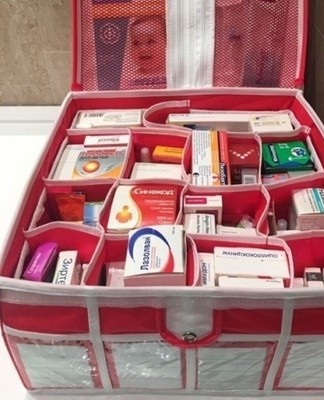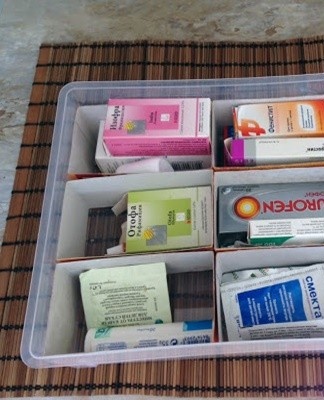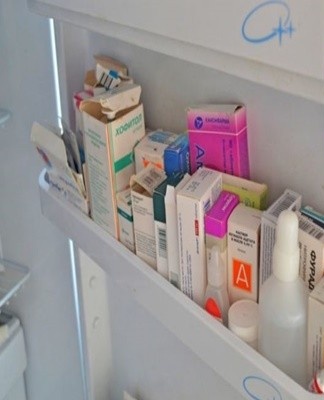How and where is it better to store medicines at home, interesting ideas and rules
How best to store medicines at home, ideas for organizing this process are of interest to many people. To organize it, it is recommended to properly form the first aid kit and choose a place suitable for its location. The creation of optimal conditions is not negligible. This will help preserve the medicinal characteristics of the funds for the period specified in the instructions.
What should a home first aid kit contain?
When forming a home first aid kit, you should definitely take into account the needs of all family members. This process is influenced by the presence of chronic diseases and the age of the household. At the same time, there are universal rules.
Tools and materials
This category includes the following:
- scissors - they are needed for cutting a bandage or plaster;
- tweezers - will help remove foreign objects from the surface of the damaged area, remove a splinter, fishbone or tick;
- syringes - used to inject or dispense medication;
- medical gloves;
- alcohol wipes - required for injections;
- hypothermic compresses - used as a source of cold for traumatic injuries;
- thermometer;
- tourniquet - helps to stop heavy bleeding.
To train
To do this, apply the following:
- Elastic bandage;
- Gauze bandage;
- cotton wool;
- plasters.
Medications
The following items should be included in the standard medication list:
- local allergy remedies - help after insect bites, with the appearance of a rash and itching;
- a burn medicine - best used in aerosol form;
- Oral rehydration agent - helps restore fluid loss after severe vomiting, heat stroke, allergic attack or diarrhea;
- a medicine for diarrhea;
- absorbents - contribute to the removal of toxic substances from the body;
- eye antiseptic solution;
- antipyretics and analgesics;
- systemic antihistamine - it is allowed to use cetirizine or loratadine;
- vasoconstrictor drugs for the nose;
- antibacterial ointment - needed to treat animal bites and infected burns;
- analgesic drops in the ears;
- hormonal antiallergic agent - helps to cope with acute symptoms of allergies.

For disinfection
Disinfectants are sometimes necessary. The most commonly used are:
- iodine solution at a concentration of 5% - used to disinfect the edges of wounds and instruments;
- disinfectant for the treatment of wounds - it is allowed to use chlorhexidine or miramistin.
Where to store a home first aid kit
It is recommended to keep medicines in a cupboard. This must be done out of the reach of young children.Therefore, preparations should be placed as high as possible. Many people keep medicine in the bathroom. However, experts advise against doing this. High humidity will cause medicines to lose their therapeutic properties.
It is not worth storing medicines in the kitchen, as they are often subject to high temperatures and high humidity.
General rules for storing medicines
In order to preserve the properties of drugs, they are advised to provide appropriate conditions.
Temperature
Today, each package of the drug contains recommendations for the temperature regime. If the annotation indicates that the drug should be stored at a temperature of + 3-8 degrees, this means that it should be put in the refrigerator within 24 hours of purchase. Otherwise, the healing effect will decrease. This applies to antibacterial drugs, hormones, vaccines and serums.
It is recommended to place drugs requiring a specific temperature on different shelves of the refrigerator. So, suppositories should be stored near the freezer, and plasters and ointments - on the middle shelves. In this case, the bulk of the drugs can be at a temperature of + 18-20 degrees.

It should be borne in mind that drugs should not be exposed to strong temperature fluctuations, as this will lead to a change in their properties.
Lighting
Usually, manufacturers produce products in dark packaging. However, they should provide additional light protection. It is better to provide a separate shelf for medicines in the closet. A perfect solution would be a pencil case or drawers for medicine.In this case, it will be possible to provide substances with reliable protection from the sun.
Humidity
The protection of substances against high humidity is not negligible. There are a number of drugs that are produced in paper packaging. If the humidity is too high, it may be damaged. Such conditions negatively affect dressings - plasters and bandages.
What drugs are stored in the refrigerator
Most medications can be stored at room temperature. However, there are funds that require special conditions. Most often, the instructions for them are marked "keep in a cool, dry place".
These substances generally include the following drug categories:
- ointments;
- interferon substances;
- eye drops;
- suppositories;
- vaccines;
- auricular substances;
- insulin;
- some of the drugs containing bifidobacteria.

In this case, it is recommended to keep the drugs on the refrigerator door. The lower shelf is also suitable for this purpose. However, it is important to place the medicines away from the freezer. Under the influence of a temperature of 0 degrees, active substances can lose their therapeutic effect. The best option is considered a temperature of + 2 to 8 degrees.
Before putting the substance in the refrigerator, it is recommended to wrap it in a bag. It is also allowed to use an airtight container. This will help minimize the negative impact of humidity changes, as condensation can build up even in innovative refrigerator designs.
Interesting home storage ideas
To streamline the storage of drugs, you can use special organizers.Such devices help to categorize drugs, which greatly simplifies their storage. A pill box is also considered a very practical device. Thanks to this, the person will not run out of medicine.
Storage of drugs requires compliance with a number of recommendations. In order for drugs not to lose their properties, they must create optimal conditions. However, it is important to control humidity and temperature.


